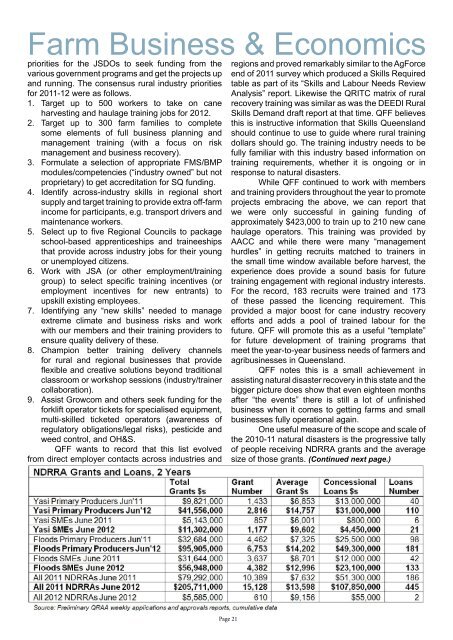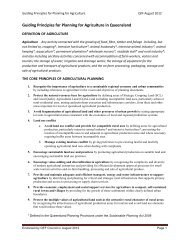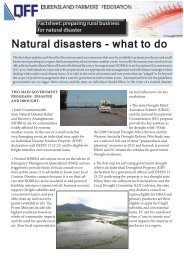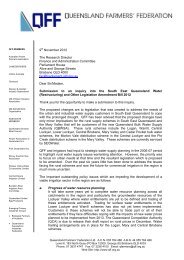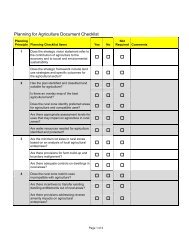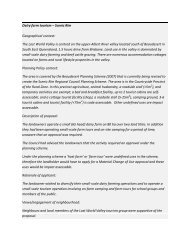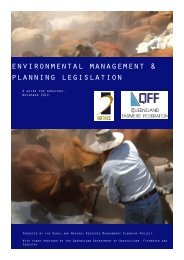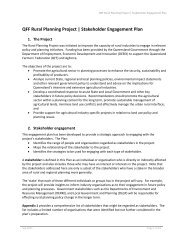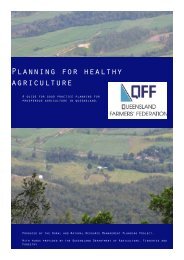here - Queensland Farmers Federation
here - Queensland Farmers Federation
here - Queensland Farmers Federation
Create successful ePaper yourself
Turn your PDF publications into a flip-book with our unique Google optimized e-Paper software.
Farm Business & Economics<br />
priorities for the JSDOs to seek funding from the<br />
various government programs and get the projects up<br />
and running. The consensus rural industry priorities<br />
for 2011-12 were as follows.<br />
1. Target up to 500 workers to take on cane<br />
harvesting and haulage training jobs for 2012.<br />
2. Target up to 300 farm families to complete<br />
some elements of full business planning and<br />
management training (with a focus on risk<br />
management and business recovery).<br />
3. Formulate a selection of appropriate FMS/BMP<br />
modules/competencies (“industry owned” but not<br />
proprietary) to get accreditation for SQ funding.<br />
4. Identify across-industry skills in regional short<br />
supply and target training to provide extra off-farm<br />
income for participants, e.g. transport drivers and<br />
maintenance workers.<br />
5. Select up to five Regional Councils to package<br />
school-based apprenticeships and traineeships<br />
that provide across industry jobs for their young<br />
or unemployed citizens.<br />
6. Work with JSA (or other employment/training<br />
group) to select specific training incentives (or<br />
employment incentives for new entrants) to<br />
upskill existing employees.<br />
7. Identifying any “new skills” needed to manage<br />
extreme climate and business risks and work<br />
with our members and their training providers to<br />
ensure quality delivery of these.<br />
8. Champion better training delivery channels<br />
for rural and regional businesses that provide<br />
flexible and creative solutions beyond traditional<br />
classroom or workshop sessions (industry/trainer<br />
collaboration).<br />
9. Assist Growcom and others seek funding for the<br />
forklift operator tickets for specialised equipment,<br />
multi-skilled ticketed operators (awareness of<br />
regulatory obligations/legal risks), pesticide and<br />
weed control, and OH&S.<br />
QFF wants to record that this list evolved<br />
from direct employer contacts across industries and<br />
regions and proved remarkably similar to the AgForce<br />
end of 2011 survey which produced a Skills Required<br />
table as part of its “Skills and Labour Needs Review<br />
Analysis” report. Likewise the QRITC matrix of rural<br />
recovery training was similar as was the DEEDI Rural<br />
Skills Demand draft report at that time. QFF believes<br />
this is instructive information that Skills <strong>Queensland</strong><br />
should continue to use to guide w<strong>here</strong> rural training<br />
dollars should go. The training industry needs to be<br />
fully familiar with this industry based information on<br />
training requirements, whether it is ongoing or in<br />
response to natural disasters.<br />
While QFF continued to work with members<br />
and training providers throughout the year to promote<br />
projects embracing the above, we can report that<br />
we were only successful in gaining funding of<br />
approximately $423,000 to train up to 210 new cane<br />
haulage operators. This training was provided by<br />
AACC and while t<strong>here</strong> were many “management<br />
hurdles” in getting recruits matched to trainers in<br />
the small time window available before harvest, the<br />
experience does provide a sound basis for future<br />
training engagement with regional industry interests.<br />
For the record, 183 recruits were trained and 173<br />
of these passed the licencing requirement. This<br />
provided a major boost for cane industry recovery<br />
efforts and adds a pool of trained labour for the<br />
future. QFF will promote this as a useful “template”<br />
for future development of training programs that<br />
meet the year-to-year business needs of farmers and<br />
agribusinesses in <strong>Queensland</strong>.<br />
QFF notes this is a small achievement in<br />
assisting natural disaster recovery in this state and the<br />
bigger picture does show that even eighteen months<br />
after “the events” t<strong>here</strong> is still a lot of unfinished<br />
business when it comes to getting farms and small<br />
businesses fully operational again.<br />
One useful measure of the scope and scale of<br />
the 2010-11 natural disasters is the progressive tally<br />
of people receiving NDRRA grants and the average<br />
size of those grants. (Continued next page.)<br />
Page 21


